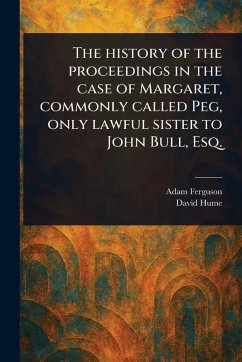Delve into the complex and often comical history of Anglo-Scottish relations with "The history of the proceedings in the case of Margaret, commonly called Peg, only lawful sister to John Bull, Esq." This 18th-century political satire, penned by Adam Ferguson and David Hume, uses wit and humor to explore the tensions and ties between England and Scotland. Through the allegorical tale of John Bull and his sister Peg, the authors offer a unique perspective on the political landscape of their time. This enduring work remains relevant for anyone interested in the historical dynamics between these two nations, as well as those fascinated by the use of satire as a tool for social commentary. A meticulously prepared print republication, this edition offers a clear window into a pivotal period of British history. Explore the roots of political discourse and enjoy the timeless appeal of clever satire. This work has been selected by scholars as being culturally important, and is part of the knowledge base of civilization as we know it. This work is in the public domain in the United States of America, and possibly other nations. Within the United States, you may freely copy and distribute this work, as no entity (individual or corporate) has a copyright on the body of the work. Scholars believe, and we concur, that this work is important enough to be preserved, reproduced, and made generally available to the public. We appreciate your support of the preservation process, and thank you for being an important part of keeping this knowledge alive and relevant.
Bitte wählen Sie Ihr Anliegen aus.
Rechnungen
Retourenschein anfordern
Bestellstatus
Storno









